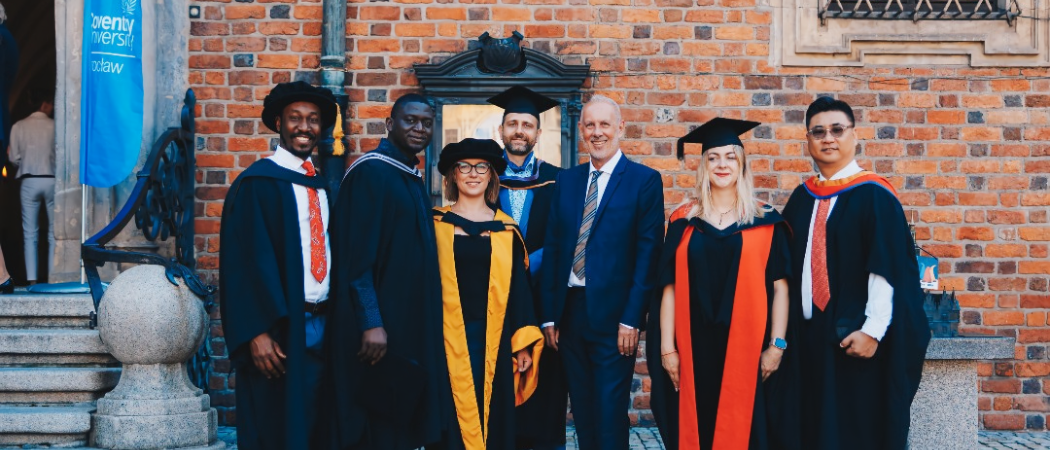The campus opened in 2020 after Brexit made it harder for EU students to go to the UK. From an initial cohort of 12 the university expects to enrol 180 – 200 students in the coming academic year

Graduating students from Coventry University Wroclaw's first cohort, who began in 2020. Photo: Coventry University Wroclaw
The first cohort of 12 students who joined Coventry University’s Poland campus in 2020 have now graduated, marking a success for the university that had to contend with a pandemic and a competitive marketplace in its early years.
The campus was opened in Wroclaw as the COVID-19 pandemic was in full swing, which hampered efforts to recruit students. But the 12 first graduates are leaving behind a far busier campus than the one they joined, with the university anticipating enrolling between 180 to 200 students in the coming academic year.
“When I look back at the past three years, opening up a new university in such a competitive place with a big academic tradition, you just need to get through and I think we did this,” said Jacek Lewandowski, campus director of Coventry University Wroclaw. “Whenever I hear about interest from a potential student, I get happier.”
The campus is intended to give Coventry University a foothold in mainland Europe. Richard Dashwood, deputy vice chancellor for research, told Science|Business in an interview last year that Brexit is making it harder for European students to move to the UK. The university had a large contingent of students from central and eastern Europe and the idea was to bring the campus to them.
Wroclaw was chosen for being student friendly, having good transport links and being close to local industry. The connection to business is one aspect that sets the Polish campus apart.
Before launching a course, the university sounds out companies to see what skills are needed and asks them to contribute to teaching. This type of thinking “is not so popular in the UK”, Lewandowski said, but is a big hit in Poland.
“We have experts from aerospace coming over to teach us, for example. That is not standard in the UK but it works well here,” he said. “It’s a pragmatic approach in career shaping.”
Daria Jurczak is one of the first 12 graduates, having completed her degree in digital and technology solutions. For her, the best part of the programme was the emphasis on practical learning over theory. “You are able to apply what you learn in real life,” she said.
She chose the course as she wanted to continue her education in English after studying at an international school in Poland. The added benefit was getting a UK-style education without having to move far from home.
Jurczak has now moved to do a masters in Germany and said her experience at Coventry University Wroclaw helped prepare her for international studies. “I’m not afraid to challenge myself in projects that I’m not familiar with,” she said. “Coventry University is a challenging university, the level is extremely high.”
Legal entity
Last year also saw the opening of the Coventry University Research Institute Europe (CURIE), which is legally an EU entity, meaning its researchers could participate in the EU’s €95.5 billion research programme, Horizon Europe, at a time when the UK was locked out of the programme because of Brexit. Now the recently agreed deal to become an associate member from January 2024 will open new doors for collaboration between Coventry University’s home base and its Polish institute, Lewandowski said.
“The news is positive. The rest of Coventry University can further work with CURIE,” he said. “Until this news, there was a threat that only CURIE colleagues could engage in EU projects.”
The university is also expanding its ties beyond Europe. In July it launched new Internet of Things and Human-Robot Interaction laboratories in Pakistan, in association with the National University of Sciences and Technology (NUST) based in Islamabad.
It is part of a wider, international approach from the university, Dashwood said. “We are proud to have a global approach to research, energised by our strong collaborative relationships with overseas institutions like NUST,” he said.





 A unique international forum for public research organisations and companies to connect their external engagement with strategic interests around their R&D system.
A unique international forum for public research organisations and companies to connect their external engagement with strategic interests around their R&D system.